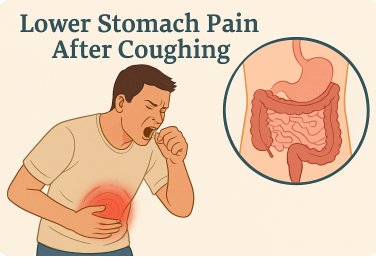Introduction
Coughing is a common reflex that helps clear the throat and airways, but when you experience lower stomach pain after coughing, it can quickly become uncomfortable and concerning. Many people wonder why their stomach hurts when they cough and whether this pain signals something serious.
Understanding the causes, treatments, and prevention strategies can help you manage the discomfort and know when to seek medical attention.
Understanding the Anatomy
To understand why coughing can cause lower stomach pain, it’s helpful to know a little about your body. The abdominal muscles, which include the rectus abdominis, obliques, and transversus abdominis, play an essential role during a cough.
These muscles contract forcefully to help push air out of the lungs. When you cough frequently or intensely, the repetitive strain on these muscles can lead to soreness or even injury, especially in the lower abdomen. Additionally, pressure within the abdominal cavity increases with each cough, which can worsen pre-existing conditions or reveal hidden health issues.
Common Causes of Lower Stomach Pain After Coughing
There are several reasons why someone might experience lower stomach pain after coughing. Some are mild and resolve on their own, while others require medical attention.
- Muscle Strain:
One of the most common causes is a simple muscle strain. When you have a persistent cough, the abdominal muscles work overtime, which can result in soreness or pulled muscles in the lower stomach area. This type of pain usually feels like a dull ache or mild sharpness and often improves with rest. - Hernia:
A hernia occurs when an internal organ or tissue pushes through a weak spot in the abdominal wall. The most common types affecting the lower abdomen are inguinal and femoral hernias. Coughing increases pressure in the abdomen, making a hernia bulge more noticeable and painful. - Appendicitis:
If the pain is sharp and located on the lower right side, appendicitis might be the culprit. Coughing can intensify this pain, which is often accompanied by fever, nausea, and loss of appetite. Appendicitis is a medical emergency and requires prompt treatment. - Pelvic Floor Dysfunction:
For some people, especially women, weak or tight pelvic floor muscles can lead to pain during activities like coughing, sneezing, or laughing. This type of pain may feel like pressure or discomfort deep in the lower abdomen or pelvis. - Ovarian Cysts (in females):
Fluid-filled sacs on the ovaries can cause lower abdominal pain, especially when coughing or during physical movement. Large or ruptured cysts require medical attention. - Diverticulitis:
Diverticulitis is the inflammation of small pouches in the colon wall. Coughing can aggravate this pain, typically felt on the lower left side, and may come with fever, constipation, or diarrhea. - Kidney Stones:
Kidney stones are hard deposits that can cause intense pain radiating from the back to the lower abdomen. Coughing may jolt or increase the pain if a stone is moving through the urinary tract. - Rectus Sheath Hematoma:
This rare condition involves bleeding into the abdominal muscle sheath, often triggered by forceful coughing or straining. It leads to localized pain and sometimes visible bruising.
Risk Factors
Several factors increase the likelihood of developing lower stomach pain after coughing:
- Chronic coughing conditions, such as bronchitis, asthma, or smoking-related lung disease.
- Engaging in heavy lifting or strenuous physical activities.
- A history of abdominal surgeries that weaken the abdominal wall.
- Aging, as muscles and tissues become less elastic over time.
- Gender-specific factors, such as pregnancy or ovarian conditions in women.
Diagnosis
When the pain is persistent, severe, or accompanied by other symptoms, a doctor’s evaluation is crucial. The diagnostic process often includes:
- A detailed medical history and physical examination to assess pain location, severity, and associated signs.
- Imaging tests, such as an ultrasound or CT scan, help detect hernias, ovarian cysts, or appendicitis.
- Laboratory tests may check for signs of infection or inflammation, especially if appendicitis or diverticulitis is suspected.
Treatment Options
The right treatment for lower stomach pain after coughing depends on the cause.
Home Remedies
For mild cases like muscle strain, home care can be very effective:
- Rest and avoid heavy lifting or strenuous activity.
- Apply a warm compress or heating pad to relax the muscles.
- Take over-the-counter pain relievers such as ibuprofen or acetaminophen.
- Stay hydrated and practice gentle stretches.
Medical Treatments
If the pain is due to an underlying condition, medical treatments are needed:
- Physical therapy can strengthen the abdominal and pelvic floor muscles.
- Antibiotics or anti-inflammatory medications treat infections like diverticulitis.
- Surgery may be required for hernias or appendicitis.
- Hormonal treatments may help manage ovarian cysts.
Here’s a table summarizing common causes and treatments:
| Condition | Symptoms | Treatment |
|---|---|---|
| Muscle strain | Soreness, mild sharp pain | Rest, heat, pain relievers |
| Hernia | Bulge, pain on coughing | Surgical repair |
| Appendicitis | Sharp right-side pain, fever, nausea | Emergency surgery |
| Pelvic floor dysfunction | Pressure, deep pelvic pain | Physical therapy |
| Ovarian cysts | Lower abdominal pain, bloating | Monitoring, surgery if needed |
| Diverticulitis | Lower left pain, fever, bowel changes | Antibiotics, dietary changes |
| Kidney stones | Flank to groin pain, nausea | Pain management, possible removal |
Prevention Strategies
Preventing lower stomach pain after coughing involves addressing both cough and abdominal health:
- Learn proper coughing techniques, such as supporting your abdomen with a pillow when coughing.
- Strengthen abdominal and pelvic muscles through gentle exercises.
- Manage chronic coughs with medical help and avoid irritants like smoking.
- Attend regular medical check-ups to catch early signs of hernias or other abdominal conditions.
When to Seek Medical Attention
While many cases of lower stomach pain after coughing are harmless, certain warning signs require urgent care:
- Severe or sharp pain that does not improve.
- Pain accompanied by fever, vomiting, or diarrhea.
- A visible bulge in the abdomen.
- Blood in the urine or stool.
- Sudden onset of intense pain.
Conclusion
Lower stomach pain after coughing is a common issue with a wide range of possible causes, from minor muscle strain to serious conditions like appendicitis or hernias. Paying attention to the type and severity of pain is key to knowing whether home care or medical attention is needed.
Strengthening your abdominal muscles, managing chronic cough, and using proper techniques can go a long way in preventing discomfort. If in doubt, don’t hesitate to consult your doctor — early diagnosis and treatment can make a big difference in recovery.
Related Articles
Are Halls Cough Drops Gluten Free? Detailed Guide for Gluten-Sensitive Consumers
When I Cough Pain in Lower Abdomen – Causes, Symptoms, Diagnosis & Treatment Explained
When I Cough Pain in Lower Abdomen – Causes, Symptoms, Diagnosis & Treatment Explained

